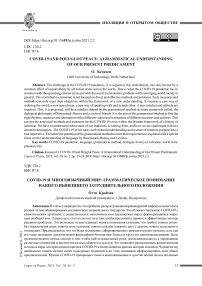COVID-19 and polyglot peace: a grammatical understanding of our present predicament
Автор: O. Kroesen
Журнал: Logos et Praxis @logos-et-praxis
Рубрика: Изоляция в открытом обществе: осмысление социальных практик в период пандемии
Статья в выпуске: 2 т.20, 2021 года.
Бесплатный доступ
The challenge of the COVID-19 pandemic, it is argued in this contribution, can only be met by a common effort of responsibility by all nation states across the world. That is what the COVID-19 pandemic has in common with the upcoming climate crisis and with the social and economic problems of the emerging world society in general. This contribution, however, is not focused on direct and effective methods and solutions. Such measures and methods can only meet their objectives within the framework of a new understanding. It requires a new way of ordering the world, a new type of man, a new way of speaking with and to each other. A new mindset and attitude are required. This, it is proposed, will be a mindset shaped by the grammatical method or, more commonly called, the dialogical philosophy of Rosenstock-Huessy and a circle of friends. It is the aim of the grammatical method to find the right rhythm, sequence and alternation of the different values and institutions of different societies and cultures. This can put the analytical methods and measures for the COVID-19 crisis within the broader framework of a history of salvation. We have to understand where each of our traditions is coming from, and how we are challenged to find a common destination. The COVID-19 crisis turns such mutual understanding and a sense of common purpose into a true imperative. Therefore the potential of the grammatical method to meet that requirement is explored with a special focus on the understanding of language by Rosenstock-Huessy and Levinas
COVID-19 pandemic, language, grammatical method, dialogue, history of salvation, world wars, planetary life.
Короткий адрес: https://sciup.org/149138064
IDR: 149138064 | УДК: 130.2 | DOI: 10.15688/lp.jvolsu.2021.2.2
Список литературы COVID-19 and polyglot peace: a grammatical understanding of our present predicament
- Ehrenberg H., 1920. Die Heimkehr des Ketzers – eine Wegweisung. Würzburg, Patmos Verlag.
- Kroesen J.O., Darson R., Ndegwah J.D., 2020. Cross-Cultural Entrepreneurship and Social Transformation: Innovative Capacity in the
- Global South. Saarbrücken, Lambert.
- Leenman B., 2016. Als God stukloopt – De maatschappij als erfgenaam van de kerk. Vught, Skandalon.
- Levinas E., 1961. Totalité et Infini. Den Haag, Nijhoff.
- Levinas E., 1963. Difficile Liberté. Paris, Albin Michel.
- Levinas E., 1973. Autrement qu’être. Den Haag, Nijhoff. Rosenstock-Huessy E., 1920. Die Hochzeit des Krieges und der Revolution. Würzburg, Patmos Verlag.
- Rosenstock-Huessy E., 1926. Vom Industrierecht – Reschtssystematische Fragen. Berlin, Herman Sack.
- Rosenstock-Huessy E., 1956–1958. Soziologie. In 2 Bd. Stuttgart, Kohlhammer.
- Rosenstock-Huessy E., 1963. Angewandte Seelenkunde.
- Die Sprache des Menschengeschlecht. Bd. I. Heidelberg, Verlag Lambert, Schneider.
- Rosenstock-Huessy E., 1970. Speech and Reality. Norwich, Argo Books.
- Rosenstock-Huessy E., 1989. Die Europäischen Revolutionen und der Charakter der Nationen. Moers, Brendow.
- Rosenstock-Huessy E., 1993. Out of Revolution – Autobiography of Western Man. New York, Argo Books.
- Rosenzweig F., 1976. Der Stern der Erlösung. Den Haag, Nijhoff.
- Winkler A., 2009. Geschichte des Westens von den Anfängen in der Antike bis zum 20. Jahrhundert. München, C.H.Beck.


